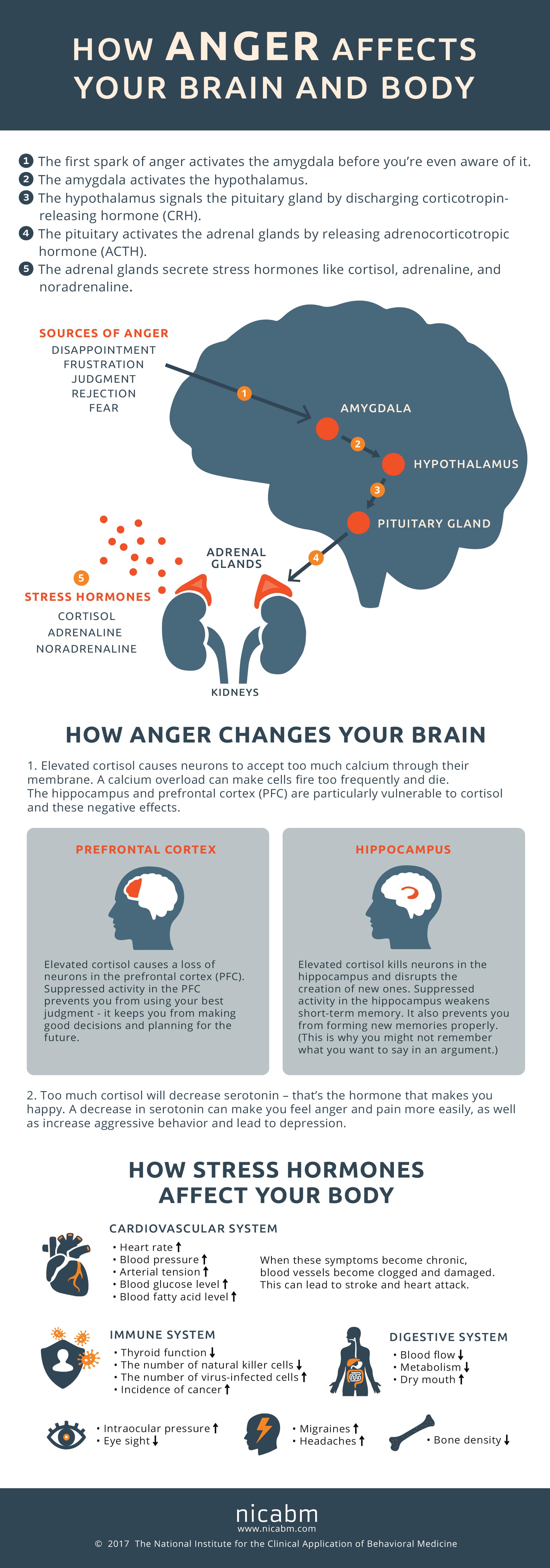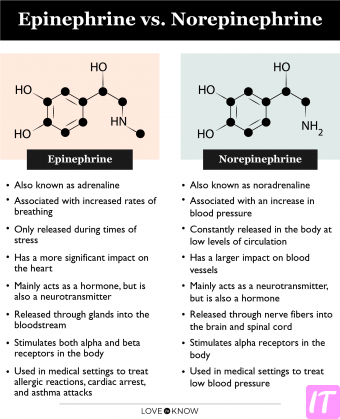Have you ever felt a sudden rush of heat envelop your body during an intense moment of anger? This physiological response is more than just skin-deep; it involves a rapid influx of hormones that prepare the body to face challenges. One of the most critical hormones in this process is adrenaline, also known as epinephrine.
Adrenaline, produced by the adrenal glands, is released almost instantaneously in response to anger or stress. This “fight-or-flight” hormone has been pivotal in human survival, driving quick reactions in threatening situations. Interestingly, studies show that within seconds, adrenaline can increase heart rate, sharpen focus, and mobilize energy reserves, all crucial for dealing with potential threats.

What Hormone is Released Quickly When a Person is Angry?
When you get angry, your body releases several hormones to prepare for a quick response. One of the first and most important hormones is adrenaline. Adrenaline, also known as epinephrine, is produced in the adrenal glands. This hormone rushes into your bloodstream almost immediately. It helps your body react faster to the situation.
Adrenaline’s effects on the body are significant and immediate. It increases your heart rate, which helps pump more blood and oxygen to your muscles. It also boosts the flow of sugar and fats in your bloodstream, providing instant energy. This can make you feel more alert and ready to tackle the issue at hand. Additionally, your breathing rate increases.
Studies show that adrenaline plays a crucial role in the “fight-or-flight” response. This response is your body’s way of protecting you. For example, it can make you stronger and quicker temporarily. This can be very useful in dangerous situations. However, constant anger can produce too much adrenaline, which is not healthy.
There are ways to manage adrenaline levels when angry. Learning to control your breathing can help. Another useful technique is mindfulness, which can calm you quickly. Physical activities, like walking or running, can also help burn off excess adrenaline. By understanding what happens in your body when you’re angry, you can take steps to manage it better.
The Role of Adrenaline in Anger Response
Adrenaline, or epinephrine, serves as a chemical messenger in your body during anger. When you get angry, your brain signals your adrenal glands to release adrenaline. This hormone gets your body ready to respond to what it sees as a threat. It is a natural part of the fight-or-flight reaction. Adrenaline prepares your body to either face the challenge or run away quickly.
Once adrenaline enters your bloodstream, it has several immediate effects. It increases your heart rate and boosts blood flow to your muscles. This gives you a burst of energy and strength. It also makes your pupils dilate to improve vision. These changes happen so fast that they occur within seconds of getting angry.
However, the role of adrenaline is not just physical. It also impacts your brain. Adrenaline heightens your alertness, making you more aware of your surroundings. This heightened awareness can help you make quicker decisions. It prepares you mentally as well as physically for any immediate action necessary.
Despite its helpful aspects, constant high levels of adrenaline are not good for your health. It can lead to stress-related issues like high blood pressure, heart problems, and anxiety. Therefore, managing anger effectively is essential. Techniques like deep breathing, mindfulness, and physical exercise can help regulate adrenaline levels. Understanding the role of adrenaline can guide you in managing anger more effectively.
Impacts of Adrenaline Release on the Body
When adrenaline floods your system, it triggers several physiological changes. One of the most noticeable effects is the increase in heart rate. This helps push more blood to your muscles, preparing them for quick action. Your breathing rate also rises to ensure more oxygen reaches your bloodstream. These changes happen almost instantly.
Adrenaline impacts your metabolism as well. It helps release sugar and fats into your bloodstream. These nutrients provide immediate energy for your muscles. This can be crucial in situations requiring physical exertion. Your body essentially gears up for any necessary action.
Another significant effect is on your senses. Adrenaline causes your pupils to dilate, improving your vision. It also sharpens your hearing. These changes make you more alert and aware of your surroundings. Being attentive can be a vital advantage in stressful or dangerous situations.
However, prolonged adrenaline release can have negative effects. Constant elevated levels can lead to health issues like high blood pressure and anxiety. This stresses your heart and can lead to long-term damage. Managing stress and anger through various methods can help control adrenaline levels in your body.
Understanding the Fight-or-Flight Response
The fight-or-flight response is a survival mechanism. It kicks in when you perceive danger. This response prepares your body to either confront or flee from the threat. It’s a natural reaction that has been essential for human survival. Your brain and body work together to keep you safe.
Several physiological changes occur during this response. Adrenaline and cortisol are released into your bloodstream. These hormones increase your heart rate and blood pressure. Your muscles receive more oxygen to prepare for quick action. These changes happen almost instantly, allowing rapid reaction times.
Your senses also become more acute. Vision sharpens as your pupils dilate. This helps you see more clearly. Hearing becomes more sensitive, making it easier to detect sounds. These heightened senses are crucial for assessing danger quickly.
The fight-or-flight response affects your mind too. It heightens your alertness, making you more aware of your surroundings. Decision-making speeds up, helping you react promptly. Your body and mind are in sync, ready to tackle the challenge. This state is intense but functional.
However, constant activation of this response can be harmful. Prolonged stress can lead to health issues like anxiety and high blood pressure. Learning to manage stress can mitigate these effects. Techniques like breathing exercises, mindfulness, and physical activity can help reset your system.
Understanding the fight-or-flight response helps in managing it better. Recognizing the signs can be the first step. Awareness leads to better control over your body’s reactions. This can improve both mental and physical well-being. It’s an important skill for overall health.
Ways to Control and Manage Anger
Managing anger starts with understanding your triggers. Knowing what makes you angry helps you prepare for those moments. Keeping a journal can be very useful. Write down what set you off and how you reacted. Over time, you will see patterns and can address them.
Another method is practicing deep breathing techniques. When you feel anger building up, take deep breaths. Focus on your breathing to calm your mind. Simple exercises like counting to ten can also work. These techniques help slow down your heart rate and clear your mind.
Physical activity is another excellent way to manage anger. Activities like walking, running, or even simple stretches can relieve tension. Exercise helps release endorphins, which make you feel better. You can create a routine that fits into your day. Physical activity is a healthy outlet for your emotions.
Learning to communicate effectively is also key. Use “I” statements instead of blaming others. For example, say, “I feel upset when…” rather than “You make me angry.” This approach helps in expressing feelings without escalating the conflict. Good communication reduces misunderstandings.
Mindfulness and relaxation practices can be very effective. Techniques like yoga and meditation help calm the mind. These methods focus on being present in the moment. Practicing mindfulness regularly can make it easier to manage anger when it arises. It trains your mind to stay calm.
Seeking professional help is also an option. Therapists can provide strategies tailored to your needs. They can help you understand your anger and teach coping skills. Sometimes talking to someone who understands can make a big difference. Therapy provides a safe space for exploring your feelings.

Frequently Asked Questions
This section addresses common questions related to the body’s response to anger, focusing on hormones and their effects. Each question dives into specific aspects to provide a deeper understanding of this complex topic.
1. How does adrenaline affect the heart?
Adrenaline increases your heart rate and blood flow when released into the bloodstream. This helps supply more oxygen and nutrients to muscles, preparing them for quick action. The faster heartbeat also ensures that your body’s organs receive enough oxygen during stressful events.
While beneficial in short bursts, prolonged increased heart rate due to constant stress can lead to health problems. It is important to manage stress effectively through healthy practices like exercise, mindfulness, and adequate sleep to maintain heart health over time.
2. What are the long-term effects of chronic adrenaline release?
Chronic adrenaline release can lead to multiple health issues such as anxiety, high blood pressure, and cardiovascular problems. The body is not meant to stay in a constant state of high alert; doing so can wear it down over time.
Long-term exposure to high adrenaline levels may also result in poor immune function and digestive problems. Therefore, learning effective stress management techniques is crucial for maintaining overall well-being and reducing these risks.
3. What role does cortisol play alongside adrenaline?
Cortisol works with adrenaline by providing sustained energy during long-term stress situations. While adrenaline gives an immediate burst of energy, cortisol helps sustain it over a longer period by increasing glucose in the bloodstream.
However, too much cortisol can suppress the immune system and elevate blood sugar levels unnecessarily. It’s essential to balance both hormones through relaxation techniques and proper nutrition for optimal health.
4. How can mindfulness help reduce anger-induced hormone release?
Mindfulness trains your brain to focus on the present moment, reducing emotional reactivity like anger. By being aware of your thoughts and feelings without judgment, you can gain better control over them and minimize hormonal surges such as adrenaline release.
This practice also promotes relaxation by engaging parts of the brain responsible for calming the nervous system. Regular mindfulness exercises have been shown to reduce overall stress levels effectively.
5. Are there any foods that help regulate hormone levels during stress?
Certain foods can help regulate hormone levels during stressful times by providing essential nutrients that support adrenal function. Foods rich in vitamin C like oranges, strawberries, and bell peppers boost adrenal health since this vitamin plays a critical role in producing adrenal hormones.
B-complex vitamins found in whole grains help maintain balanced energy levels.
Omega-3 fatty acids from fish like salmon or flaxseeds have anti-inflammatory properties that counteract stress effects on the body.
Including these foods in your diet supports healthier hormonal balance.
Conclusion
Understanding the rapid release of adrenaline when angry provides valuable insights into how our bodies respond to stress. This natural reaction prepares us for immediate action but can have long-term effects if not managed properly. Balancing the body’s hormonal responses is crucial for maintaining overall health.
Effective techniques like mindfulness, exercise, and proper nutrition can help regulate hormone levels. By recognizing and addressing these physiological responses, we can better manage our emotions and improve our well-being. Proactive strategies are essential for a healthy, balanced life.







